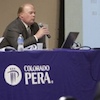 Greg Smith, the Chief Executive Officer of the state’s retirement fund for employees, is ringing in the new year with a raise that bumps his base pay to $406,000, along with a $79,000 incentive bonus. This comes sixteen months after Smith was granted a whopping 20% raise. Smith also has contract clauses that will bring his total compensation close to $900,000 in 2018.
Greg Smith, the Chief Executive Officer of the state’s retirement fund for employees, is ringing in the new year with a raise that bumps his base pay to $406,000, along with a $79,000 incentive bonus. This comes sixteen months after Smith was granted a whopping 20% raise. Smith also has contract clauses that will bring his total compensation close to $900,000 in 2018.
Meanwhile, state workers last saw a raise in 2014 – a 2.5% cost of living adjustment. And we assume private sector workers received even less.
Walker Stapleton, a member of the PERA board through his position as State Treasurer, strongly objected to Smith’s latest compensation package on the grounds that Smith has done nothing to close the gap of PERA’s $30 billion unfunded liability. Stapleton also points out that Smith’s bonus was not tied to any performance metric. The PERA board has the flexibility to award Smith a bonus of up to 30% of his base pay, and the group simply settled on a 25% number this year.
In fact, Smith’s organization drastically underperformed the assumed 7.25% return on plan assets last year, coming in at a meager 1.5%. Every year of underperformance exasperates the unfunded liability that would likely fall on the shoulders of taxpayer if the pension’s investment performance cannot keep up.
Just this year, Stapleton won a small battle with PERA, getting the fund’s accountants to lower the pension’s expected rate of return from 7.5% to 7.25%. As the expected return on assets is lowered, the unfunded liability increases, because capital in the fund is not growing at a pace to keep up with its pension obligations.
The editorial board of the Colorado Springs Gazette also came out hard yesterday against Smith’s raise. “By no definition can PERA be deemed a success” the Gazette wrote, excoriating Smith for actually bragging about last year’s dismal 1.5% return.
Until PERA starts to at least hit the 7.25% annualized return for a couple straight years (we’re not holding our breath), Smith should not see an extra penny of taxpayer money. And another year like 2015 should have the board looking for a clawback…or perhaps even a replacement.
